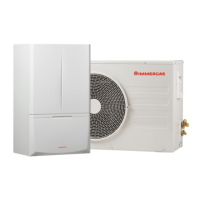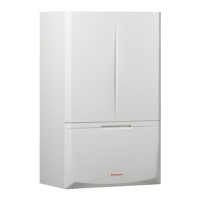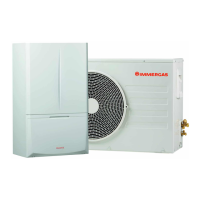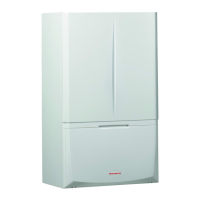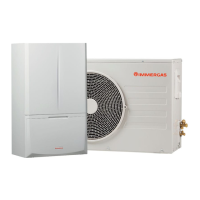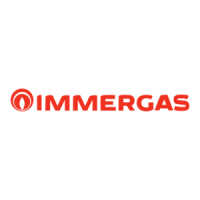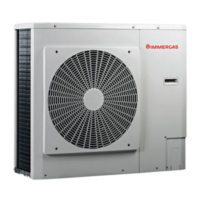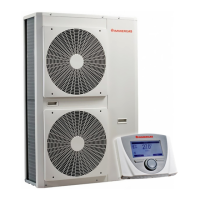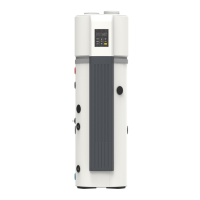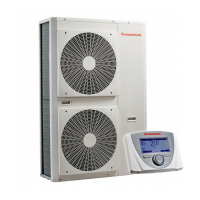Do you have a question about the Immergas MAGIS COMBO PLUS Series and is the answer not in the manual?
Guidelines for safe and efficient indoor unit positioning and installation.
Provides key physical dimensions and connection sizes for the indoor unit.
Details antifreeze functions and protection measures against freezing.
Describes the hydraulic connection kit and its components for installation.
Covers heating system cleaning and making hydraulic connections for optimal operation.
Instructions for connecting the chiller line, referencing the condensing unit booklet.
Guidelines for safe and correct electrical connections, including earthing and safety devices.
How to connect and use optional remote controls and room chrono-thermostats.
Discusses using external probes for system operation management.
Adjusting system operation using heat regulation settings and curves.
Information on Immergas flue systems, air intake, and fume evacuation requirements.
Tables providing resistance factors and equivalent lengths for various duct types.
Explains outdoor installation requirements and configurations for partially protected areas.
Step-by-step guide for installing horizontal concentric kits for air intake and flue exhaust.
Instructions for installing vertical concentric kits for air intake and flue exhaust.
Details the installation of the separator kit for divided flue exhaust and air intake.
Guide for installing the C9 kit for specific shaft configurations for air intake and flue exhaust.
Explains the process and requirements for ducting flues or technical slots.
Describes indoor installation configurations for Type B appliances.
Information on connecting flue exhaust to flues or chimneys, including different configurations.
Standards and positioning requirements for flues, chimneys, and terminals.
Steps for filling the heating system with water and ensuring correct pressure.
Instructions for filling the condensate drain trap to prevent flue gas passage.
Procedures for commissioning the gas system according to technical standards.
Details the operating limits of the system in heat pump mode, including temperature ranges.
Step-by-step guide for commissioning the heat generator when coupled with a condensing unit.
Explains the operation and adjustment of the two circulator pumps for different modes.
A detailed breakdown and key of the indoor unit's components.
Lists optional kits available for enhancing system functionality and connectivity.
Recommendations for regular cleaning and maintenance to ensure unit integrity and performance.
Important safety precautions to be observed during use, installation, and maintenance.
Explains the functions of the control panel buttons and display indicators.
How to use the system in different modes (summer, winter, cooling) and its automatic energy source selection.
Details various operating modes like CARV2, external probe, dehumidify, stand-by, off, automatic vent, solar, and condensing unit disable.
Table listing error codes, their causes, and solutions for the indoor unit.
Guide to accessing and navigating the parameters and information menu.
Procedures for safely shutting down the indoor unit and disconnecting supplies.
How to check and restore the central heating system pressure.
Instructions on how to drain the indoor unit and the system.
Details the unit's antifreeze functions and protection measures.
Guidance on cleaning the indoor unit casing.
Procedures for permanently decommissioning the indoor unit.
A detailed hydraulic diagram of the Magis Combo Plus unit with component keys.
Electrical wiring diagram for the indoor unit, including component identification and colour codes.
Instructions on how to check and clean the system filter.
Common issues, causes, and solutions for system malfunctions.
Description of the gas valve's functions, status LEDs, and related settings.
Procedures for converting the heat generator to different gas types, requiring professional service.
How to calibrate fan revolutions for optimal performance, especially after gas conversion.
Steps for adjusting the air-gas ratio and CO₂ levels for efficient combustion.
Guide to programming the Printed Circuit Board (PCB) for various operational parameters.
Parameters for managing heat regulation based on outdoor temperature and zone settings.
Settings for integrating alternative power sources for DHW and central heating.
Settings related to fan speed during DHW output and ignition phases.
Details on various maintenance and operational parameters (M01-M17) for system control.
Function to test combustion parameters by adjusting unit power.
Prevents the pump from blocking due to prolonged inactivity.
Prevents the 3-way valve from locking due to prolonged inactivity.
Protects the system from freezing by activating the heat generator.
Integrates solar energy for DHW heating.
Disables the outdoor unit operation via a contact.
Forces heat generator operation to preheat water for DHW or heating.
Manages summer/winter diverter valves based on mode selection.
Ensures correct deaeration for central heating systems and floor systems.
Performs thermal shock for new radiant panel systems.
Manages room humidity in cooling mode using humidistats or humidity sensors.
Enables test functions and pump down procedures.
Manages heat source selection (heat pump vs. generator) for central heating and DHW.
Comprehensive list of checks and maintenance tasks to be performed annually.
Step-by-step instructions for removing the unit casing for maintenance.
Procedures for disassembling the condensate trap siphon for cleaning.
Data on variable heat output for different gas types and operating modes.
Key combustion parameters for different gas types, including CO₂ and NOx values.
Comprehensive technical specifications and performance data of the appliance.
Explanation of the terms and codes found on the appliance's data nameplate.
Technical parameters for combination boilers as per Regulation 813/2013, including efficiencies.
| Refrigerant | R32 |
|---|---|
| Energy Efficiency Class (Cooling) | A++ |
| Operating Temperature Range (Cooling) | +10°C to +46°C |
| Type | Air to Water Heat Pump |
| Power Supply | 230V, 50Hz |
| Heating Capacity | 4.5 - 16 kW |
| Cooling Capacity | 4.5 - 16 kW |
